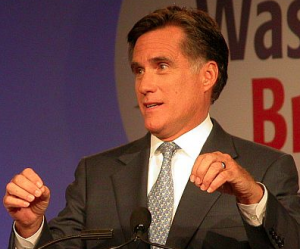Mitt Romney Rolls Out Education Proposal
 By Raisa Camargo, Voxxi
By Raisa Camargo, Voxxi
Romney said the United States is facing a “national education emergency,” while promising what he would do as president to revamp the education system.
The strategy includes changing funding formulas, boosting charter schools and providing parents of low-income and special need students a choice of which schools their children can attend.
“Here we are the most prosperous nation on earth, but millions of our kids are getting a third-world education and America’s minority children suffer the most. This is the civil rights issue of our era,” Romney said. “As president, I will pursue a very bold policy of change that will restore the promise of our national education system.”
He made his speech at the U.S. Chamber of Commerce to a gathering of Latino small business owners.
Romney blamed President Obama for siding with teacher unions, who he claims are the biggest donors to the president’s campaign. The former Massachusetts governor said that the president has put campaign financing ahead of students.
Part of Romney’s plan involves expanding parental choice by using a voucher system to allocate federal education funds for parents to use when choosing a school. It might include the possibility of a private or charter school.
Romney acknowledged that he would continue backing the No Child Left Behind law. He added that he would reward states that improve teacher effectiveness.
“For the first time in history, federal education funds will be linked to a student, so that parents can send their child to any public or charter school, or to a private school, where permitted,” he said. “States will be rewarded if they regularly evaluate teachers for their effectiveness and compensate the best teachers for their success.”
According to statistics cited by Romney, the United States lags behind other countries globally. He said the nation ranks 14 out of 34 in reading globally; 17 out of 34 in science; and 25 out of 34 in math.
Jim Lyons, a civil rights attorney who worked in the U.S. Department of Education under President Jimmy Carter, said that the voucher system would only exacerbate the problem for Latino students.
“Parents would have to locate a school that was willing to educate their children for the amount of the voucher,” Lyons stated. “More importantly, private schools are not held to the same civil rights requirements that apply to public schools.”
Other components of Romney’s plan includes expanding the District of Columbia’s Opportunity Scholarship Program, using flexible block grants rewarding teachers and facilitating federal aid for college finance.
Obama’s education reform program has hit several road blocks considering his ‘Race to the Top’ program. The education program awards states with the highest performance in schools. Critics say it makes education a competition.
Recent polls show Romney and Obama in a tight race. According to media reports, these polls show that neither candidate is above five points. The surveys indicate Romney is posing a challenge to Obama.
Florida Sen. Marco Rubio, who has often named as a potential running mate for Romney, attended the summit. Rubio gave a personal speech on family values, while intertwining it with the spirit needed for Latino entrepreneurs to succeed.
None of the two politicians referred to immigration directly.
That didn’t discourage DREAM Act students from rallying outside the U. S. Chamber of Commerce. One of the Dreamers went inside and interrupted Romney’s speech. Cesar Vargas, a dreamer who aspires to join the military, told VOXXI the pressure is placed on Rubio if he aligns himself with Romney.
“It’s just simply a hypocrisy. He (Romney) is talking about the American Dream, but what his American Dream is not is the American dream for Latinos,” said Vargas. “Undocumented immigrants are starting businesses at a faster rate and he comes here to try to sell that?”
Among Hispanic voters, Romney has ground more ground to cover. In a recent Washington Post-ABC News polling, Obama leads Romney 71 percent to 27 percent among Latino voters.
Raisa Camargo is a staff writer at Voxxi.
This article first appeared in Voxxi.
[Photo By c.berlet/publiceye.org]
